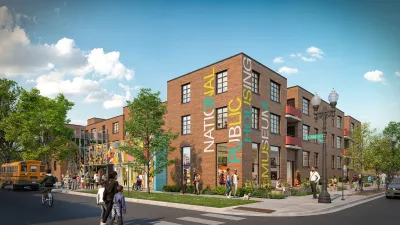Singapore has a robust public housing program, which comes from the government operating 80% of the housing stock. Neal Peirce spells out how the system works.
In the small city-state of Singapore, few people can afford to have a private residence. Instead, citizens have to obtain government-operated public housing, which is 80% of the dwellings in Singapore.
The requirements to get public housing are stiff: the applicants must have continuous employment for at least a year, be at least 21 and married or with plans to be married, be at least 35 if they're single, and have no ownership of private housing. But once the applicant has signed the dotted line, the apartment is theirs to sell.
Neal Peirce analyzes, "It's easy for outsiders to say there's government-enforced conformity in Singapore. And indeed, a nationwide set of government-underwritten social clubs provides constant recreation and educational activities, targeted at age groups ranging from little children to elders on canes. The conformity and government sponsorship might concern Americans. But the delivered, year-in, year-out services, clearly enriching Singaporeans' peoples' lives, far outshine those in all but the most affluent most U.S. communities."
FULL STORY: A Nation of Public Housing

Planetizen Federal Action Tracker
A weekly monitor of how Trump’s orders and actions are impacting planners and planning in America.

Maui's Vacation Rental Debate Turns Ugly
Verbal attacks, misinformation campaigns and fistfights plague a high-stakes debate to convert thousands of vacation rentals into long-term housing.

Restaurant Patios Were a Pandemic Win — Why Were They so Hard to Keep?
Social distancing requirements and changes in travel patterns prompted cities to pilot new uses for street and sidewalk space. Then it got complicated.

In California Battle of Housing vs. Environment, Housing Just Won
A new state law significantly limits the power of CEQA, an environmental review law that served as a powerful tool for blocking new development.

Boulder Eliminates Parking Minimums Citywide
Officials estimate the cost of building a single underground parking space at up to $100,000.

Orange County, Florida Adopts Largest US “Sprawl Repair” Code
The ‘Orange Code’ seeks to rectify decades of sprawl-inducing, car-oriented development.
Urban Design for Planners 1: Software Tools
This six-course series explores essential urban design concepts using open source software and equips planners with the tools they need to participate fully in the urban design process.
Planning for Universal Design
Learn the tools for implementing Universal Design in planning regulations.
Heyer Gruel & Associates PA
JM Goldson LLC
Custer County Colorado
City of Camden Redevelopment Agency
City of Astoria
Transportation Research & Education Center (TREC) at Portland State University
Jefferson Parish Government
Camden Redevelopment Agency
City of Claremont





























